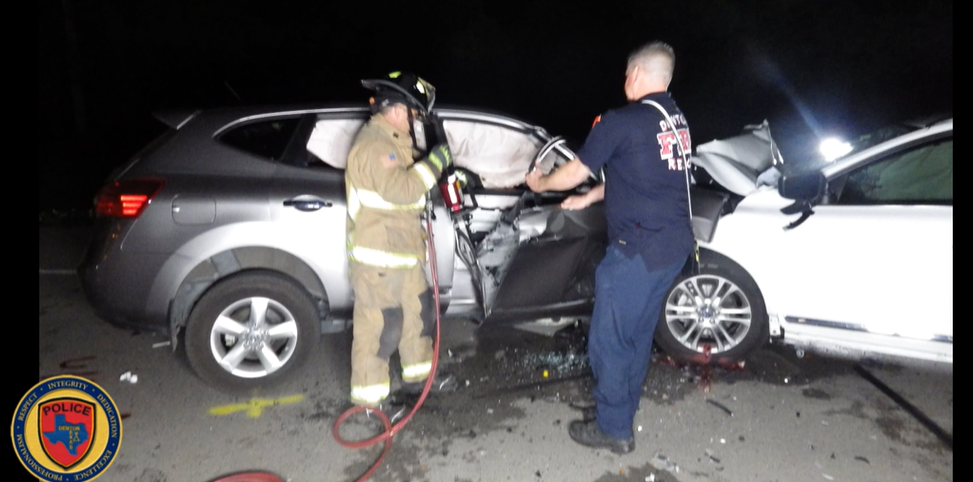On April 9, 2016, James Shaffer was out of town on business in New Jersey when his cell phone rang. The caller told him that his wife and daughter were dead—killed in a head-on car crash back home in Texas.
Shaffer’s wife, Emma, had been driving the couple’s 12-year-old daughter, Tita, home from cheer practice and dinner. They were heading north on US Highway 377, abiding by the speed limit and traffic laws, when a car heading south veered into the northbound lane and crashed into the Shaffers’ car. The other driver, who was also killed along with her 4-year-old daughter, was texting at the time.
“I would never wish for anyone to ever receive a call like that,” says Shaffer, who spent the evening scrambling for a flight home, finally finding one for 5 a.m. “The worst part was, when I got back, having to sit my 10-year-old son down and explain that his mom and sister weren’t coming home.”
What happened to Shaffer and his family is all too common. In 2019, in Texas alone, 378 people died as a result of distracted driving, according to the Texas Department of Transportation. Statistics from the National Highway Traffic Safety Administration show that 3,142 people died nationwide. Federal crash data also reveal that cell phones were reported as a distraction for 13 percent of all distracted drivers in fatal crashes. Distressingly, in a recent AAA survey, 51 percent of drivers admitted that they text and/or email when they’re driving alone.
These figures are more than just statistics to the Shaffer family, who have suffered the deaths of two remarkable individuals. Emma volunteered at Liberty Christian School, where Tita and Tita’s brother, Jimmy, attended, and where teachers and other parents speak of Emma’s selfless service and generous spirit. Tita competed in gymnastics and was a competitive cheerleader at Champion Cheer in Southlake, Texas. The impact of the loss of two such vibrant spirits is hard to imagine. “You feel like your whole life has been sucked out of you,” says Shaffer. “You have no life, no breath, no anything.”
Shaffer, a senior manager in the tech support industry, channeled his grief into action, resolving to help other families avoid a similar fate. He devoted time and energy into raising awareness about the dangers of distracted driving.
Shaffer was instrumental in helping to get legislation passed in Texas to address those dangers. He lobbied the city of Denton, close to where the fatal crash occurred, to enact a hands-free law. He attended town hall and city council meetings, where he introduced himself and shared his story, putting a human face to the issue. “It’s easier to kick around objections to a law when you don’t have somebody in front of you who’s been affected,” he says, noting that some people asserted that bans were a violation of personal liberty. “I told them that driving is a privilege you have to earn, and it comes with laws that you have to abide by. So, texting and driving is not part of your fundamental rights.”
While it is illegal for drivers to read, write, or send messages on hand-held phones under the Texas law, drivers are still allowed to hold phones and talk on them. Denton’s ordinance, passed in 2016, is more restrictive: It bans using hand-held phones for any reason while driving. “The only thing you’re allowed to do is engage and disengage whatever hands-free device you have,” says Shaffer. “Imagine if we had been successful in passing a law sooner. Maybe four lives could have been saved.” Shaffer’s wish is for a total ban on cell phone usage for drivers throughout the state—zero exceptions. ”

In the meantime, he continues to fight for traffic safety. In 2019, he spoke at a Teen Driver Safety Fair hosted by AAA Texas and the City of Dallas Municipal Court. “Mr. Shaffer has taken grief from an unimaginable loss and turned it into positive action,” says Daniel Armbruster, AAA Texas spokesperson. “His powerful personal message on the dangers of distracted driving captivates audiences and saves lives.”
Shaffer also speaks to high school groups. “They’re the most at-risk kids,” he says. He shows a video prepared by the Texas Department of Transportation and by the Denton Police Department that includes audio of the 911 call involving his wife and daughter. In that incident, the other driver sent this text: “I’ll see you at the skate park.”
“One text caused four young women’s lives,” Shaffer tells his audience. “How much is your text worth?”